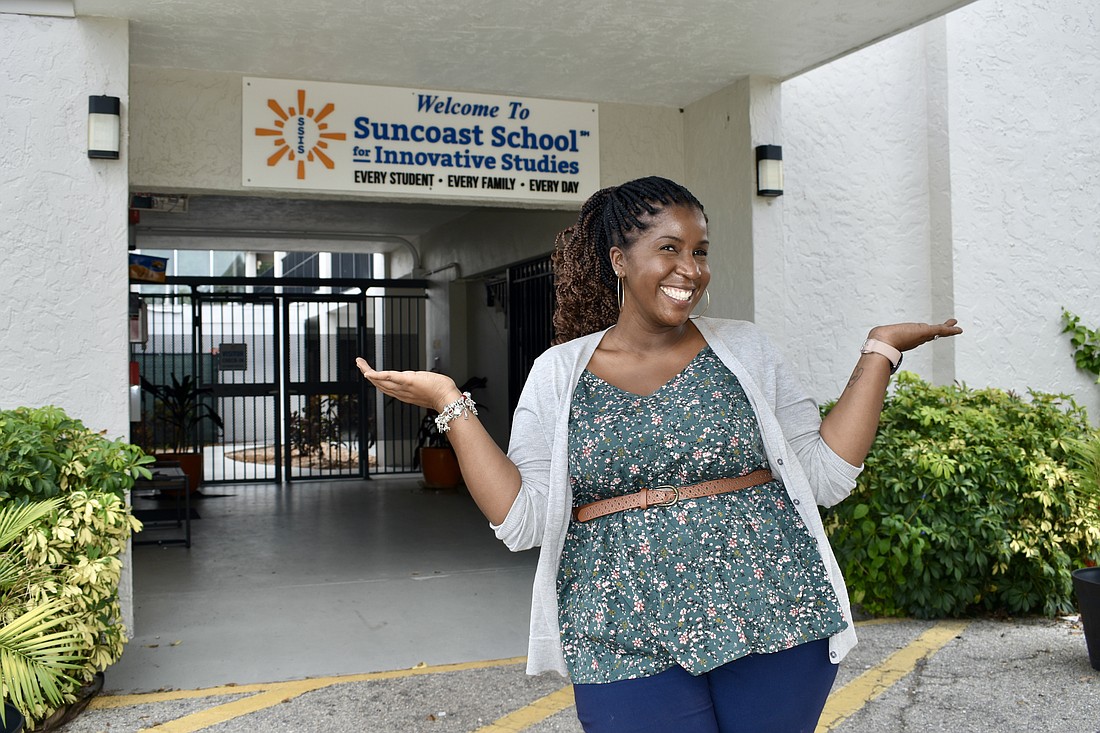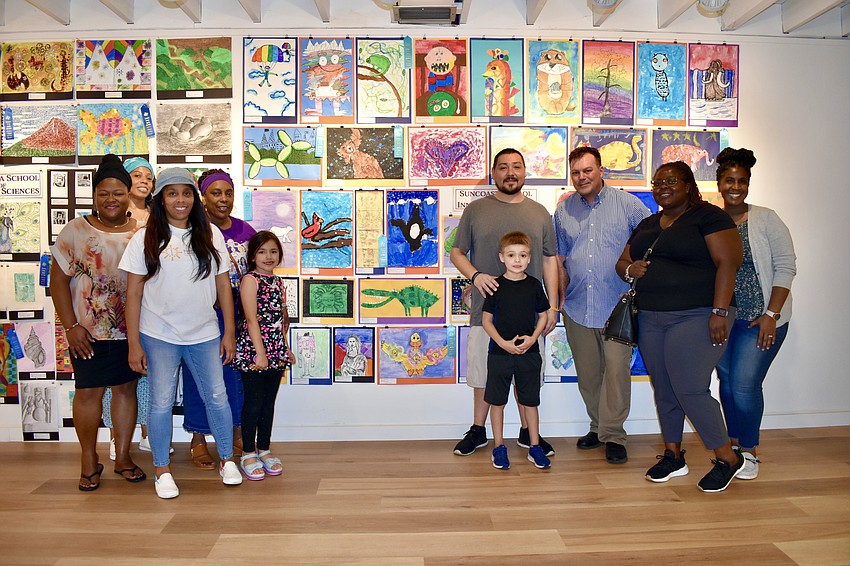- April 11, 2025
-
-
Loading

Loading

Principal Fayth Jenkins is on an educational mission in her first full school year in the role — a mission involving a multitude of intelligences.
The Suncoast School for Innovative Studies is rooted in the Theory of Multiple Intelligences developed in the 1980s by psychologist Howard Gardner. That means the staff's aim is to help students discover their unique talents and interests, while elevating their existing talents, Jenkins said.
To further this mission, and to attract more of the community, the school has been seeking new resources and partnerships since Jenkins became principal in October of 2022.
Gardner introduced the idea that people have more than one intelligence, which Jenkins takes to mean that students do not have to be “pigeonholed" into a specific subject.
“You don't have to be great at reading, you don’t have to be great at math, you don't have to be the best scientist, but your talents or your natural interests can actually help you in some of those other areas, and through having a growth mindset and having exposure, you actually can find that you have many intelligences, not just one,” she said.
The school has introduced a sports program held during its new after care program, as well as other partnerships related to subjects including music, science, dance and more.
After opening in 1999, SSIS was, until last year, the only Title I public charter school in Sarasota County, serving the highest percentage of students on free and reduced lunches, Jenkins said.
Jenkins said the school, with its multifaceted approach, has been successful at closing the learning gap, with most students making one to two years of gain.
Part of working with multiple intelligences is also understanding that the different fields intersect, she said. For instance, all teachers are trained in the Math & Movement program, which integrates counting and number sense into sports and is also used by P.E. Coach Keron Gordon.
When it comes to art lessons, there's more than meets the eye. Instructor Wesley Tippett delves into history by introducing an artist through a book, then moves onto geometry, discussing angles and lines. Finally, he arrives at a music component as students create the art.

“He's an amazing resource to our school, and I'm really hoping to continue to expand his program to some after school offerings and some more community things too, because our kids enjoyed that immensely,” Jenkins said.
She said the school has been able to benefit many kids struggling with interpersonal and intrapersonal skills.
“Through some of the other intelligences, like the linguistic or the music, they actually start to learn, ‘Oh, I'm a really likable person, I do have interpersonal skills, or this makes me feel good, and I can communicate that,” she said.
The school modifies its approach to meet students where they are, Jenkins said. This could mean that if a student is skilled at playing Pokemon — not realizing that the game is based on math, including addition and subtraction — Pokemon-related materials could be included in their learning.
“The main vision is that every single child can learn, but you're not going to learn it like the next person, and that's OK,” she said.
Due in part to the school’s commitment to teaching across a range of areas, it was important for it to be innovative with the programs it offers, Jenkins said.
A major addition last year was the sports programs, included in the school’s new after care program at no additional cost.
This year, the school will hold flag football competition as part of a series that will feature a different sport each quarter, moving onto basketball and then to a new sport, pickleball, that the school is now testing.
P.E teacher Keron Gordon, a former Louisiana State University athlete with a background in football and baseball, said he thinks pickleball will be easier than tennis for the students, with its small paddle, teams, and a shorter court.
The community has seen a demand for after care, Jenkins said, while the program activities have resulted in students being more excited to attend school. Designed to be affordable, the co-ed program is offered for kindergarten through fifth grade for $25 a week.
Jenkins credits its vision to Gordon, who said as a child, he found that when the same students played against each other, certain students became dominant, which discouraged competition.
“If you play against somebody you don't know, you're always going to try to be your best,” he said.

Gordon also hopes that by introducing kids to sports earlier, and preparing kids for what it takes to succeed in them, it will help high schoolers maintain at least the minimum grades required to play sports when they reach high school.
Last year, the school played four games — two football and two basketball games — with the Bradenton public charter school Visible Men Academy.
“We didn't win the football, but we got them back in the basketball,” Jenkins said.
They’re now looking for a rematch, and Jenkins hopes to expand the competition to other clubs as well.
After care programs and sports are not the only new offerings.
Modern Marimba will be attending the school once a month for music exploration, bringing drums and xylophones and teaching how to establish a rhythm and beat.
The school is working with FUNducation, a nonprofit focused on S.T.E.A.M. (Science, Technology, Engineering, Arts, and Mathematics) education for kids from underrepresented groups, which will teach topics like coding, robotics, drones, motors, and more, through an enrichment block and an after-school program. Jenkins said kids have expressed a great interest in this offering.
“Kids really wanted something else. They wanted to work with Legos and robotics and motors and coding.”
Another activity she said many kids are interested in is time outdoors (Naturalistic intelligence is one of the intelligences) which is why the school will be visiting the site of the Conservation Foundation of the Gulf Coast, in Osprey, which has offered to develop a curriculum for the school.
“You can read about science, but you can't just read about it,” Jenkins said. “You can introduce it there; they need some hands-on experience.”
The experience involves dip netting, fishing and kayaking. It will also incorporate topics like reading and the arts.
The school is working with Sarasota Ballet so students can participate in Dance – The Next Generation, the ballet’s community engagement program. Students who remain in the program receive a college scholarship covering needs including tutoring, transportation and mentoring.
This year in May, the school took part in the Art Center Sarasota North County K-12 Spring Art Show. Tippett said it would help the kids take ownership of their work, and to help supplement that goal, he tasked them with creating an invitation for their friends and family.
For the first time, the school has two full sensory rooms, giving a space devoted to occupational therapists and speech therapists for those students with Individualized Education Program, 504 plans, functional behavior assessments and behavior plans.

Other initiatives include adding a data coach, Shirley Campbell, and an instructional coach, Jacqueline Hinds, who work closely together.
However, the school is looking to sustain needs beyond the academic. Since last year, the school has worked with All Faiths Food Bank to offer a food pantry, allowing everyone in the community free access to offerings that range from steaks to full Publix meals.
“It is really amazing food,” she said. “They make sure that it's a well-rounded, healthy but also fulfilling meal.”
With all the progress the school is currently making, Jenkins said she is looking forward to what the future brings.
“I’m excited to see where they grow from here,” she said.